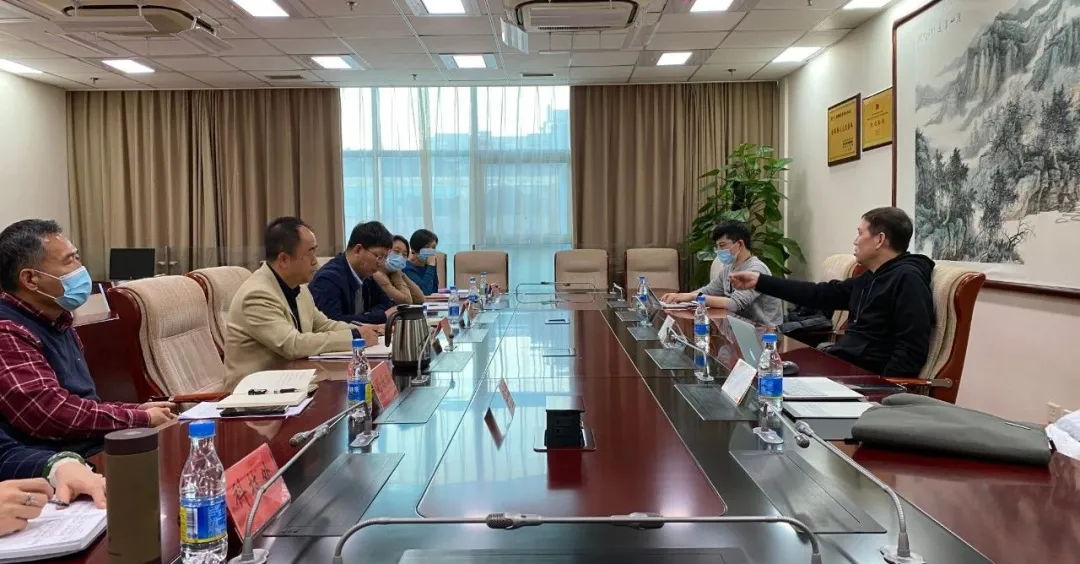Doing a good job in the protection of urban biodiversity is an important part of the construction of ecological civilization. Recently, at the invitation of the Beijing Gardening and Greening Bureau, Dr. Zhou Jinfeng, Secretary-General of China Biodiversity Conservation and Green Development Foundation (CBCGDF) and his team had an in-depth exchange with the Bureau's related departments on biodiversity conservation.
First of all, the relevant leaders of the Beijing Gardening and Greening Bureau introduced the changes brought about by the afforestation and greening as the ecological environment of Beijing in recent years and their future efforts. "Beijing's forest coverage rate has gone from 1.3% in the 1950s to about 44% now, which is a very big improvement. At present, the amount of greening in the main mountainous areas of Beijing has basically reached the standard. The focus of the next step is to shift from quantitative growth to quality improvement and strive to build a harmonious relationship between the people and the ecological environment. "
Dr. Zhou Jinfeng put forward the "two guidance" recommendations for the current afforestation work: "The first is to take ecological civilization as the guidance and ecological diversity protection as the premise. The theory that 'Lucid waters and lush mountains are invaluable assets' tells us to put 'lucid waters and lush mountains' in the first place. In the process of carrying out afforestation work, the protection of the ecological environment should be given top priority. The second is to be aware of the threats in the forest. At present, as many as 1.7 million kinds of viruses and bacteria are hidden in forests around the world, and they are preparing to spread to human society. This pandemic is the best warning to us. Even if the relative probability of these viruses and bacteria appearing is small, it is actually a probability problem that will happen sooner or later in the context of the continuous increase of the scale of forest parks. In this regard, we must do a good job of public education, so that the people are deeply aware of the hidden dangers in wild animals and plants. "
Subsequently, the Beijing Gardening and Greening Bureau introduced the work related to biodiversity conservation, including the “Living Green Spaces” project carried out by Beijing. Specifically, it includes drawing a habitat map of Beijing, establishing a biodiversity database, carrying out biodiversity restoration in many places, and absorbing the general public to participate in the protection of biodiversity through nature education, etc. At the same time, promote the improvement of Beijing's wildlife protection regulations, combat illegal capture of wild animals, and establish nature reserves based on key protected animals and plants. And build various monitoring instruments in these areas to obtain the dynamic distribution of animals, carry out a large number of popular science publicities, and so on.
Dr. Zhou pointed out the lack of openness and transparency in the current projects carried out by the Bureau. He said: "At present, most of the projects of government departments are only based on their own industry as the leading factor to promote industrial development. The essence is still the mechanism of industrial civilization. The technical industry has a specialization. For the biodiversity conservation issues involved in these projects, more experts in this field should be involved in the discussion of project planning. This is also one of the tasks of the China Biodiversity Conservation and Green Development Foundation (CBCGDF). Only by taking advantage of the best of everyone can we discover the problems in the preparation stage of the project and make improvements to avoid ‘better late than never’. "
The two sides held in-depth discussions on the construction of Nanyuan Forest Park, which has attracted much attention recently. Dr. Zhou suggested: “The restoration plan should be guided by the idea of ecological civilization and adhere to the four restoration principles of conservation, nature, limitation, and macro, and be adopted the three major environmental governance axioms of ‘non-proliferation’, ‘do not harm’, and ‘full disclosure’. To fully protect the natural habitat, because it is a natural ecosystem that has evolved over hundreds of millions of years. Some experts believe that the ‘dirty soil’ in Nanyuan may contain plant seeds from many years ago, and the seeds of millennia in the soil may also germinate. The so-called "weeds" are also native species in Beijing, and more effective measures must be taken to protect biodiversity. The most important thing is not only the grass and the soil itself, but after planting some native Beijing saplings uniformly, the strong growth of the grass and trees will bring many natural species of Beijing to the local area, which not only saves the preliminary funds, but also facilitates the maintenance management in the later period. With the current human perception of nature and the level of science and technology, it is difficult to build an artificial ecosystem that can be maintained for a long time. Many economists criticized us for being extreme protectionism, letting people starve to death in order to protect a few birds. In fact, what we are doing is not protecting rare animals at all, but protecting the earth, the habitat on which 7.5 billion people depend. This is the core of the idea of ecological civilization. The purpose of our protection is not only for our generation to survive, but also for our future generations. In the final analysis, it is to protect humanity itself.”
In addition, the two sides also exchanged views on the legal system construction of biodiversity and wetland protection. In view of the situation that biodiversity conservation is still in the development stage, it still needs the help and guidance of professional organizations and experts such as CBCGDF in biodiversity conservation. Dr. Zhou pointed out: “At the macro level, I hope the relevant departments in Beijing will further sort out and revise the relevant regulations on wetlands to meet the needs of ecological civilization and social welfare protection. Not only that, the current regulations on urban greening pay too much attention to aesthetics, which violates the idea of ecological diversity and ecological civilization and needs to be revised as soon as possible. At present, the world is paying more and more attention to biodiversity. As a national first-level society, we, CBDGDF, follow a series of instructions on the ecological field of our country, and are very willing to help your work and give ideas.”
In the end, the two sides expressed a consensus after exchanging views: “We must complement each other's strengths and work together to do a good job in Beijing's biodiversity conservation through full exchanges. Moreover, we will use this meeting as an opportunity to establish a communication mechanism to ensure the instant sharing of information.”

(Photo credit: CBCGDF)
Original Chinese article:
http://www.cbcgdf.org/NewsShow/4854/14611.html
By / Maggie
https://www.paypal.me/CBCGDFChina
http://www.cbcgdf.org/English/ConfirmDonaTion/0.html


(Please indicate "I read CBCGDF" in the payment notes, thank you!)
